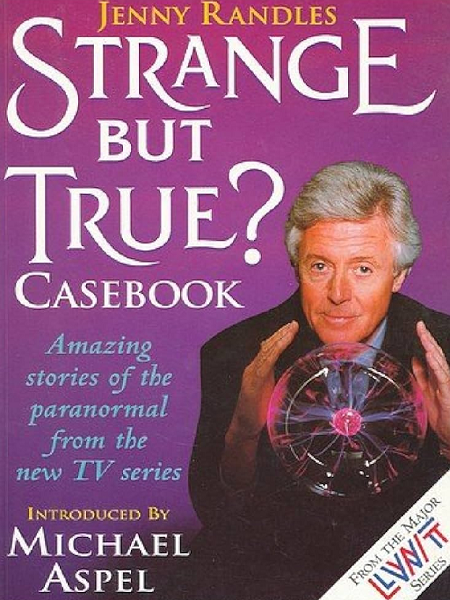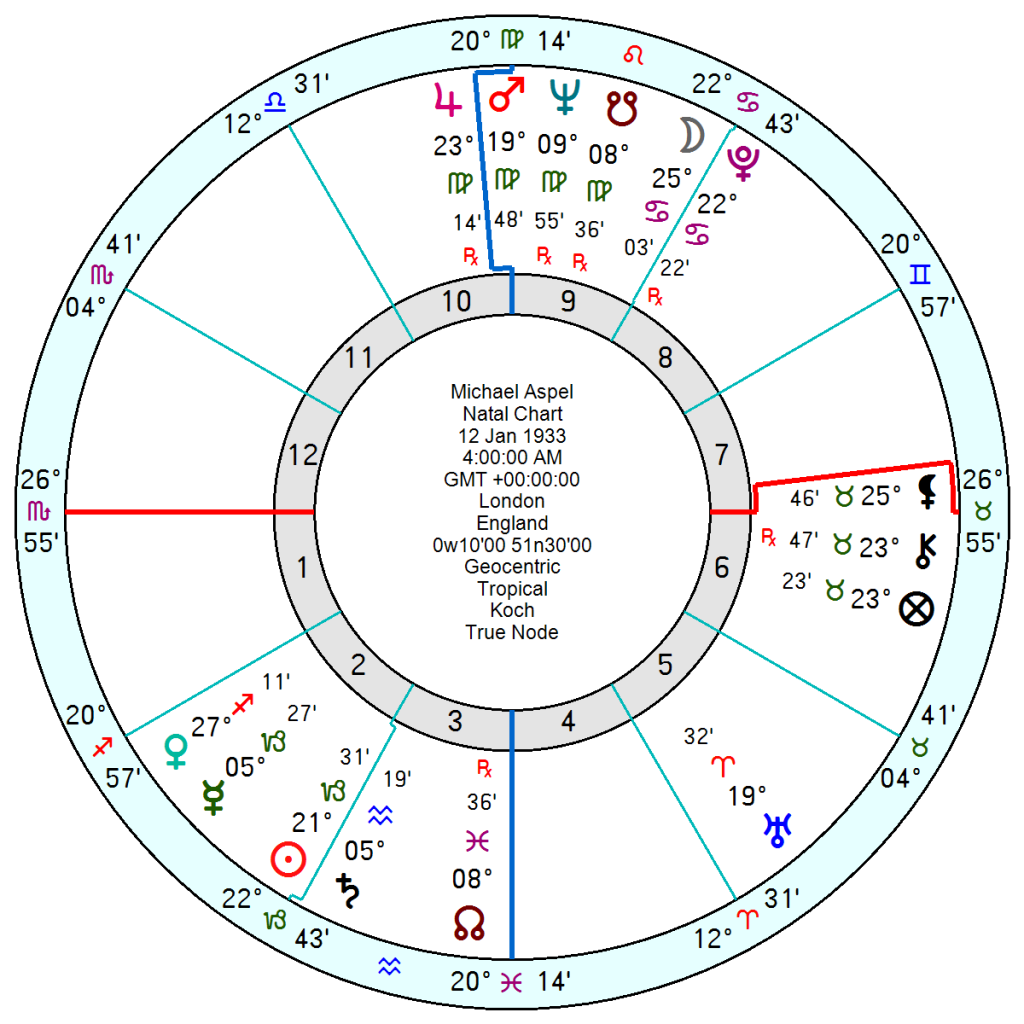

Michael Aspel, an amiable TV personality whose laid-back approach made soothing viewing in popular shows like Crackerjack, Ask Aspel, Aspel & Company, Give Us a Clue, This is Your Life, Strange but True? and Antiques Roadshow has an unexpectedly wayward and unconventional chart.
Now 90 he is looking back on an illustrious career which he never considered a success story. And he regrets his inability to stay within the confines of any of his three marriages. What is more remarkable is that throughout he remained a good and constant father to his seven children from his various short lived matrimonial stints. He said marriage made him claustrophobic which he put down to his war time evacuation for five years from aged seven to live with an old couple and returned in his teens to a violent parental home.
Born 12 January 1933 4am London, he has a lucky, successful Jupiter in Virgo on his midheaven conjunct an upbeat and ambitious Mars trine a Capricorn Sun. His Venus in optimistic Sagittarius was in a sugary sweet square to his Jupiter. All good to cement his guy next door image.
What stands out in his chart is his Capricorn Sun opposition Pluto Moon in Cancer square Uranus in Aries in his 5th house of entertainment and children. It could have made him explosive, rebellious, a status-quo upender – instead of which it gave him an unconventional approach to his children. While at the same time allowing him the freedom to pursue an independent emotional life.
An intriguing astro-oddity.

It is interesting tgat he chose family oriented women but in the end chose to be a weekend dad himself. Which is how I interpreted it.
Kids change everything. And while some families can operate with everyone having a different schedulevithers can’t.
I expect tgat Aspel wasn’t the sort to phone home that he was going to be late or that he wasn’t going to bother with the oarent teacher meeting or help ‘little Johnny’ with his maths homework. There is more to parenting than taking your kids to the zoo.
Margaret Mead, the famous anthropologist, predicted that–as human longevity escalates–serial marriages will become the norm. Makes sense…..can’t imagine staying with the same partner for 100 years or so. Hard enough to stay in a marriage for 10 years.
Seems to me like “longevity” is the key word in her prediction. Where people used to die before 80, if you’re now living to 100+ and your spouse dies in your 70s, you remarry because there’s still another 30 years to go.
As opposed to many people remarrying these day by the time they’re 50 because divorce is much easier to do – legally, socially and logistically.
In Tudor England the average length of a marriage was about 12 years which is not dissimilar to modern Britain. The main difference is that th death not divorce drove the process. Catherine Parr had survived two husbands before she married Henry VIII and she outlived him to die married to her fourth husband, Thomas Seymour, at the age of only 36 in 1548. Serial monogamy was actual common for a lot of British history.
Good point, thank you
Comments from him in Times interview:
“I have so many regrets about my personal life, but there has also been great joy and that’s mostly to do with my children. I had quite a lot of them — seven from three marriages. Though I left their mothers, in some cases after a relatively short time, I really enjoyed fatherhood and I think the children enjoyed being with me. My second marriage — to Ed’s mum, Ann — lasted five years but I saw Ed and his twin sister, Jane, every week. We’d get the tape recorder out and do ad lib dramas. It makes me wonder what got in the way of all that. Well, I know what got in the way, it was my behaviour. I found being married claustrophobic and felt compelled to leave.
I don’t look for excuses, I’m bewildered as to why it happened. But there may be something in being an evacuee during the Second World War.”
It’s very interesting to think about how that t-square plays out for him. I have a Gemini sun friend which is square to Pluto and Uranus. She has four children accumulated from three relationships and is a cancer moon . She is very committed to the kids, grandchildren (and was to her parents); yet she is somewhat disparaging of the very solid man who has stuck by her these past 20 years and she frequently goes off to do her own thing to create space. She is quite emotionally repressed by her own admittance and I suspect being male, Aspel had the same lack of emotional awareness and what then happens is instead of making space or talking about feelings, they blow the doors off.
As for marriage itself – I don’t know how people manage multiple ones, I’ve never managed to find one person who wanted to be with me.
I’ll add. Similar to Aspel, who has been in a relationship for the past 30 years, my friend has been in a relationship with this guy (father of the last two children) for 20+ years. Seems to me that “having an escape option” keeps them happier. I used to think like that when I was younger, but the need to keep options open disappeared once I improved my ability to express myself, my needs and negotiate compromises.
Aspel might not be the best example, thank you for providing the details Marjorie. Rather it triggered a more general thought about interpreting these things. Astrology practice sometimes takes a while to catch up with social change, as consensus from accurate birth data can be slow to acrue into something insightful.
I do wonder how he would have felt if he always got 50% or more custody rather than once a week. He may not have felt the partnership so confining then!
Thank you for that Julie, she was indeed spot on with her prediction of serial relationships becoming the norm. There seems to be a short window in time that facilitated these 70 year marriages of a certain generation. Looking at the Queen and Prince Philip and also the Carters, it’s interesting to note the role of the women in those relationships and the common sense of purpose beyond raising children.
Three marriages is unusual, but living to age 90 also used to be very unusual. I’m not saying that he was a great husband or anything like that, I don’t really know the details, but I do think that now we are living longer lives we have to reevaluate what is unusual. If you took away the word marriage and called them long term relationships, would this number still look unusual by modern standards?
When I looked at my family history, second and even third marriages were not unsual, because one spouse would die of cholera or childbirth or something. Life expectancy in 1850 was 42 years old. We have never expected so much of ourselves and our partners. would you agree? I have a Venus/Uranus/Descendant conjunction so i have to check these things aren’t just me
While things have changed – Aspel’s three marriages were over by the time he reached 60. If you want to think longterm relationships then he’s been in #4 since 1994. It’s unusual for his generation I’d say, my parents were about the same age and married their whole lives as were many of their relatives and friends. Divorce was uncommon among them. Think also the Queen/Prince Phillip. That said, showbiz people do seem to have more marriages/divorces – and I’d guess it’s about opportunity as much as anything.
He said in an interview that he found marriage claustrophobic and confining and he regretted his inability to stay the course.
Definitely not just you Tara! I agree, people live a long time and for many sustaining one marriage for life is not possible, particularly if you marry young. In my various stabs at family history I’ve been astonished to discover that quite a few people simply married bigamously, or even trigamously, which was much easier in the 19th century when divorce was almost impossible. Even coming into the twentieth, I found bigamous marriages. The other thing that’s not mentioned much, historically, is the number of working class people who never married but just pretended to be married. The seventh house, which would represent marriage partners, is also the house of open enemies. Perhaps that tells us something?
Thanks Jane. You’re right, I’ve heard someone else say that they discovered this too, even as late as the 1920’s as you say.
I was going to comment in the recent post about 8th houses. Typically the sign on the ascendant and on the 8th house are inconjunct / incompatible and difficult to reconcile.
Aspel, for example, has Scorpio ascendant which results in Taurus descendant and therefore a strong neediness to create a solid relationship. Yet when the relationship moves to the deeper stuff (the 8th), it’s got Gemini on the cusp – not a placement that wants to get too deep and it wouldn’t be hard to think that may be part of why he bailed from his marriages.
Sometimes, depending on the latitudes and how the houses are created you could get a more compatible pairing – for example, born a little later Aspel could have Sag asc/Gemini 7th & 8th. But typically you’re pairing Aries/Scorpio; Taurus/Sag; Gemini/Capricorn; Cancer/Aqua etc.
You wouldn’t expect someone with 5 planets in earth plus moon/pluto in Cancer to be unreliable. Really highlights the importance of his Uranus being the focal point of the t-square. And also how those planets/SN clusted around the 9th make him a wanderer. But with sun/mercury/venus in 2nd house he will have felt very self-assured especially with Sag on its cusp – always plenty more fish in the sea.
As a Cancer Moon I would say we love the idea of home but wax and wane day to day. Oddly Cancer moon men I know have all taken a leading parental role, I don’t know if that is coincidental. Venus rules his 7th house and in Sag would like a lot of freedom in relationships too so I too can see how he didn’t like being tied down.